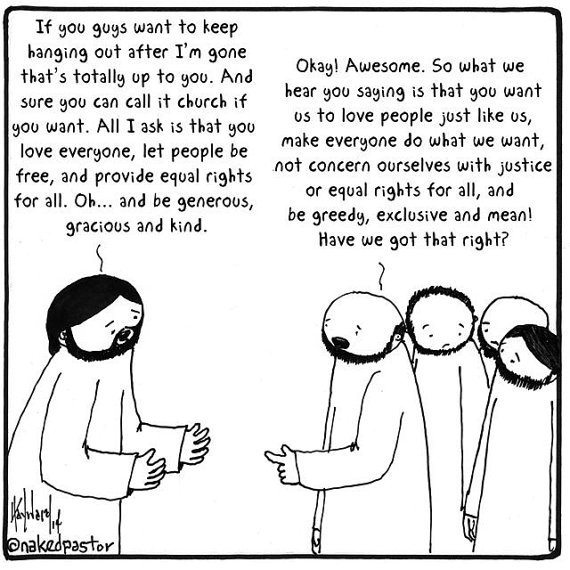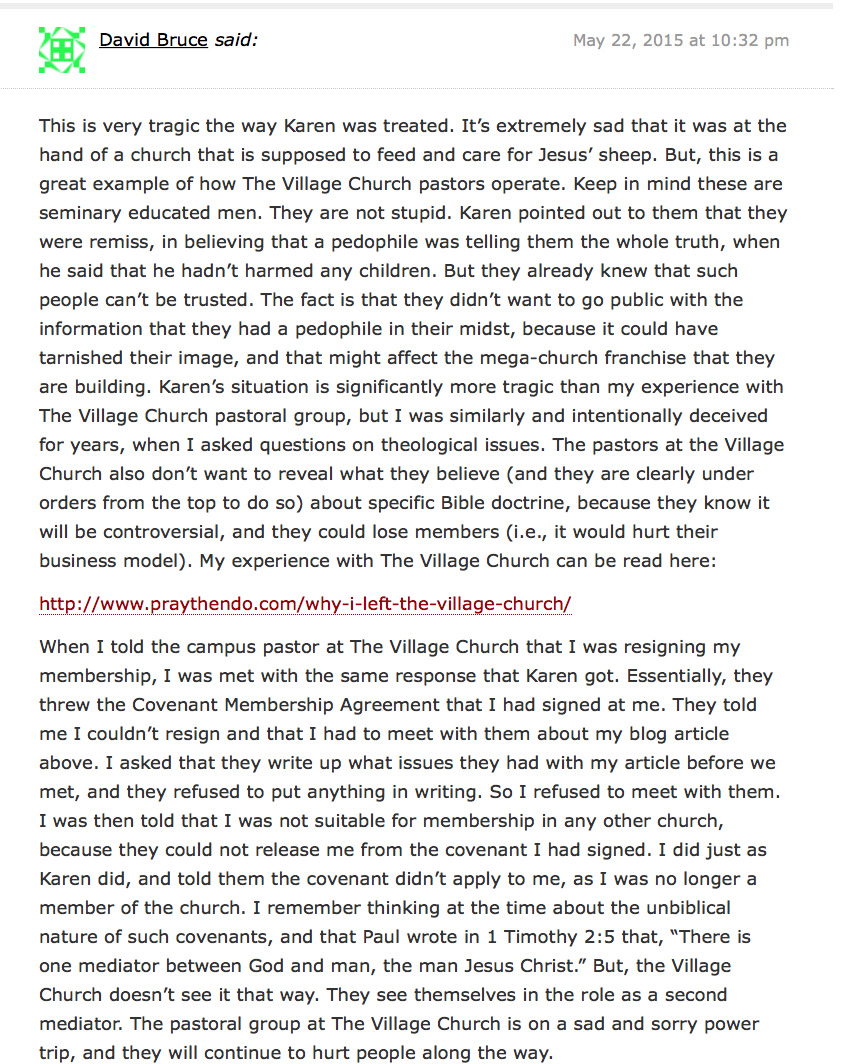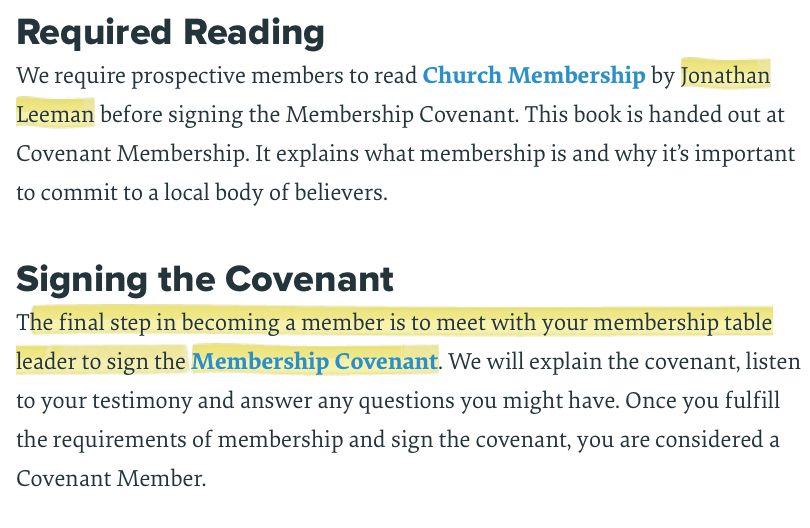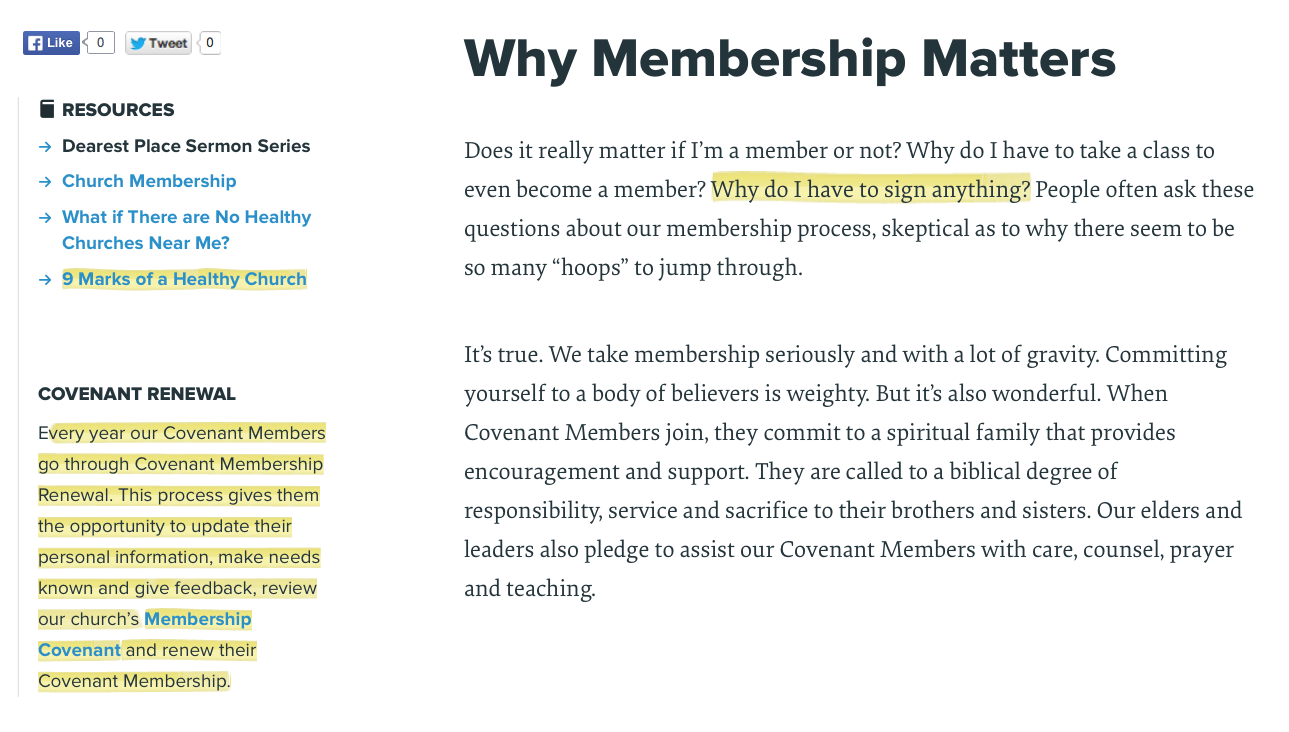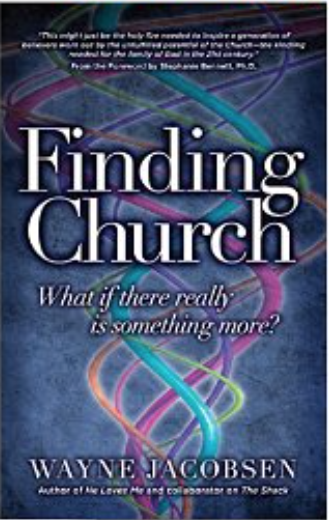
“I think Jesus taught us that we have a Father who loves us more than we know, and if we could sort that out we would know how to treat each other.”
Jacobsen, Wayne (2014-10-13). Finding Church: What If There Really Is Something More (Kindle Locations 667-668).
Prior to reading any further I would urge you to read the recently published article “Five Reasons to Say “No” to a Church Covenant” by Wade Burleson, pastor of Emmanuel Baptist Church in Enid, Oklahoma. It comes as no surprise that some of his fellow pastors in the institutional church are not to happy with Burleson.
It seems the evangelical church in the USA is awash in scandal and heavy-handed, abusive leadership. The latest is the almost unbelievable story of a woman married to a pedophile who, when she discovered this fact, had her marriage annulled. Her church (The Dallas Northway Campus of the Village Church) then attempted to place her under church discipline! Read the complete story here. Matt Chandler is the senior pastor of the Village Church. I would consider Chandler a member of the gospel glitterati, those celebrity Christian speakers who frequently speak at conferences and write books. He is friends with John Piper, Mark Dever, and C.J. Mahaney, among others.
Yesterday I came across an audio of Matt Chandler raging at an individual who had dared criticize him anonymously. I thought it was a good example of how these celebrity leaders can act when they are crossed. Please listen to it. The entire audio is under three minutes and Chandler’s rant begins about two-thirds of the way through. I tweeted a link to the audio on Vimeo yesterday and now I have found out that the Village Church has been successful in their efforts to have the Vimeo clip removed! I can’t blame Village Church officials for moving swiftly to have it removed. It portrays Chandler in an undesirable light, but one would hope Christian leaders would behave in a better manner. I think their PR man gave them some bad advice too; everyone knows once something is on the internet there is no reeling it back in. The Village Church efforts to remove all traces of the audio clip will only result in a broader audience hearing it.
Below is a comment from a former member of the Village Church. This story is, unfortunately, not unique to the Village Church, but seems to be a growing phenomenon among conservative Christian churches of the neo-reformed bent. These churches stress membership covenants or contracts and also heavy handed discipline. The 9 Marks para-church organization (an offshoot of Mark Dever’s Capitol Hill Baptist Church) seems to be the main purveyor of this material. Jonathan Leeman, an assistant pastor at Mark Dever’s Capitol Hill Baptist Church, has authored the key books these neo-reformed churches turn to and he seems to be the point man for implementing what they undoubtedly believe are scripturally sanctioned beliefs. I would be remiss if I failed to point out that their view appears to be causing untold harm in the churches who adopt their views, driving many good people away from the church. The fruit this material is producing seems to be worm infested rotten apples. I would suggest there is a better way.
“Pastors like myself have spent large amounts of time over the last fifteen years picking up the pieces of broken lives that resulted from distortion of truth by extreme teachings and destructive applications on discipleship, authority, and shepherding. Victims of this movement are usually born-again Christians and are fundamentalist and evangelical in their orientation. The errors are covered in many different terms like delegated authority, covering, unquestioned submission, covenant, commitment to a fellowship, etc…. Terms change from time to time. Submission may be called “commitment,” “covenant relationship” or “divine order” in church government. Many times terms aren’t used at all; it is the actions that tell you what is going on.”
-Gilbert Trusty, “Recovering From Abusive Authority” (Conference Evangelical Ministries to New Religions in Philadelphia, PA, Sept. 14, 1994).
As found in “Twisted Scriptures: Breaking Free From Churches That Abuse,” by Mary Alice Chrnalogar, pages 23.
“The pressing needs were never about spiritual growth, but about the tangled web of money, approval, and power. Scripture warns us how they blind us, and history demonstrates how often we create structures that end up rewarding those ambitions and exploiting the powerless. People who don’t know Jesus and how he works have an insatiable desire for money, acclaim, and power. Conflict ensues as people maneuver to get what they want; when they do it in God’s name they will justify any tactic.”
Jacobsen, Wayne (2014-10-13). Finding Church: What If There Really Is Something More (Kindle Locations 1016-1019). TrailView Media. Kindle Edition.
“What would the church of Jesus Christ look like if it were made up of people who were learning to live in the same reality Jesus did, with an eye on his Father and a compassionate heart for people around him? How well would we love one another and how much would we reflect his glory if we weren’t spending so much time and energy attending to our institutions?”
Jacobsen, Wayne (2014-10-13). Finding Church: What If There Really Is Something More (Kindle Locations 339-341).
“Instead of seeking a church structure that could sustain the kind of community my heart longed for, I gave up and simply started to follow what God was unfolding in my heart. Yes, I was accused of being bitter, independent, and rebellious, but I was far from bitter. I was certain that I was not wired to fulfill the cultural role of a vocational pastor, and I walked away in hopes of uncovering something else. Neither was I independent; I had lots of friendships and a deep thirst to find authentic community. I might have been rebellious, but certainly not toward God, only toward the religious structures that seemed to undermine his work.”
Jacobsen, Wayne (2014-10-13). Finding Church: What If There Really Is Something More (Kindle Locations 564-568).
“You can’t read the Gospels without realizing that Jesus was not as preoccupied with the church as we are today. As far as we know, he didn’t teach his disciples how to plant them, build them, or manage them. He didn’t hold any leadership training conferences, give them a workbook with all they needed to know safely tucked inside, or even start a seminary. He didn’t show them how to form and manage a nonprofit organization. He didn’t teach them how to hold a service, to lead worship, to exegete an Old Testament passage, or even to write the New Testament. He didn’t craft a doctrine statement so they would know true believers from fake ones. He didn’t give them seminars on small group fellowship, organizing a leadership team, or planning an evangelistic outreach. Instead he simply walked through life, touching people he met, showing them the reality of his Father’s kingdom, and inviting them to live in it. He wasn’t ever in a meeting that looked like our Sunday services. In fact he didn’t seem to do one thing that would have prepared his disciples to hold a congregational service or organize an international organization to sustain the life of his followers. Of course, just because he didn’t do those things doesn’t mean we can’t. But it might make us wonder about their value or at least question the idea that you can’t be part of his church if you’re not involved with a group of people doing those things. Jesus didn’t talk much about the church at all, mentioning it only twice. He said simply that he would build it and he gave some counsel about dealing with someone who is wittingly or unwittingly destroying it. It doesn’t seem like much, does it? Even at that, what if he told us, and more importantly showed us, everything we needed to know about his church?
The assumption, of course, is that he didn’t. That’s why most seminars about church life turn to a few verses from Paul, or worse yet Moses’ leadership over the tribes of Israel. While Paul does talk about the church often, and writes to the church in various localities to address problems in or to answer questions about their shared life, Paul didn’t seem to do any more of those things we identify with church today than Jesus did. We never see him in a Sunday service with a worship team or as a Bible lecturer. He certainly would never have conceived of multiple “churches” in the same city having different names, different doctrines, and different “worship styles.” They didn’t have ruling boards to make decisions or buildings to gather in, other than their own homes. So when we quote Scriptures and apply them as justification for whatever we might be doing at the Whoville Community Church, we miss the point entirely. Our way of organizing congregations in the twenty-first century has little in Scripture to commend it. We spend more time making the Scriptures fit our preconceived view of church, rather than deriving our understanding of church from the Scriptures themselves. Our view of “church life” today has far more to do with institutional identity, meetings, rituals, ethics, and doctrines than demonstrating what a community of Godly love looks like. From that foundation, it is difficult to find our way into the reality of Christ’s church. Maybe he didn’t talk so much about the church because it was not the means to his end. What if he knew it was simply the fruit of his working and that it takes shape quite easily wherever people learn to follow him? If so, then Jesus really did tell us everything we needed to know about the church by not talking about it. His entire ministry was focused on a kingdom that he was inaugurating. Like the beachhead at Normandy, he invaded this broken world to insert the life of God into human history. He embodied that kingdom, spoke about it in parables, and invited people to embrace it by embracing him. Matthew, Mark, and Luke use the term “kingdom” more than one hundred times in their recollections of Jesus and what was important to him. The terminology switches in John. He uses the term kingdom sparingly, but uses the words life and eternal life to talk about the same reality. For John, eternal life didn’t just describe life after death, but the quality of God’s life that we can experience now by entering into an affection-based relationship with Father, Son, and Spirit. Jesus opened the door for us to participate in the divine community in the midst of this broken creation”.
Jacobsen, Wayne (2014-10-13). Finding Church: What If There Really Is Something More (Kindle Locations 605-640).
“When you begin to question two thousand years of tradition, you can expect others to be threatened and try to discourage you. They will misinterpret your frustration as bitterness and accuse you of being selfish. They will discount your hungers by saying that we can’t expect the church to be perfect when it is filled with broken humanity. They will tell you that we can’t just sit around and do nothing when there is so much work to be done. Most of all they will be afraid that in leaving long-established traditions you risk your own salvation. Following him even when others wrongly judge and exclude you is why so few take this road. Those who do only do so because they are convinced that there is a reality beyond their experience that continues to beckon them. Jack was a surgeon missionary from Scotland to the Congo in the 1950s and had to leave during the revolution. He ended up in New Zealand working as a surgeon and eventually as a hospital administrator. During that time he was deeply involved in congregational activities, including serving on elder boards and other committees. One day twenty-five years ago, as he was praying about his ongoing frustration about the state of the church, a thought came across his mind that he attributed to Jesus: “If you want to be part of the church I’m building, you have to leave the one man is building.” So he resigned his positions in the congregation and found himself on an extraordinary journey that many others have taken. Do I think we all have to leave our congregations to see the one Jesus is building? If you are already part of a generous faith community that isn’t performance-based, you may be able to embrace that life without leaving. Others have found it necessary to leave because the dynamics are so destructive. What we can all do is stop thinking that the church humanity is building and the one church Jesus is building are the same thing. Sometimes they overlap, but they are not the same, and if we don’t know that we will continue to get lost in our human efforts to replicate what cannot be achieved by human effort. What we need is not a better system to manage but a different kind of person who is learning to live in a new creation.”
Jacobsen, Wayne (2014-10-13). Finding Church: What If There Really Is Something More (Kindle Locations 942-958).
Standing By
Stefan Van Voorst, “Out Beyond” album
For further reading see Matt Redmond’s excellent article here.
John Pavlovitz has written an excellent article titled “Matt Chandler, Village Church, Acts 29 Network and The Long Overdue Funeral For Frat Boy Christianity” which can be read here.
